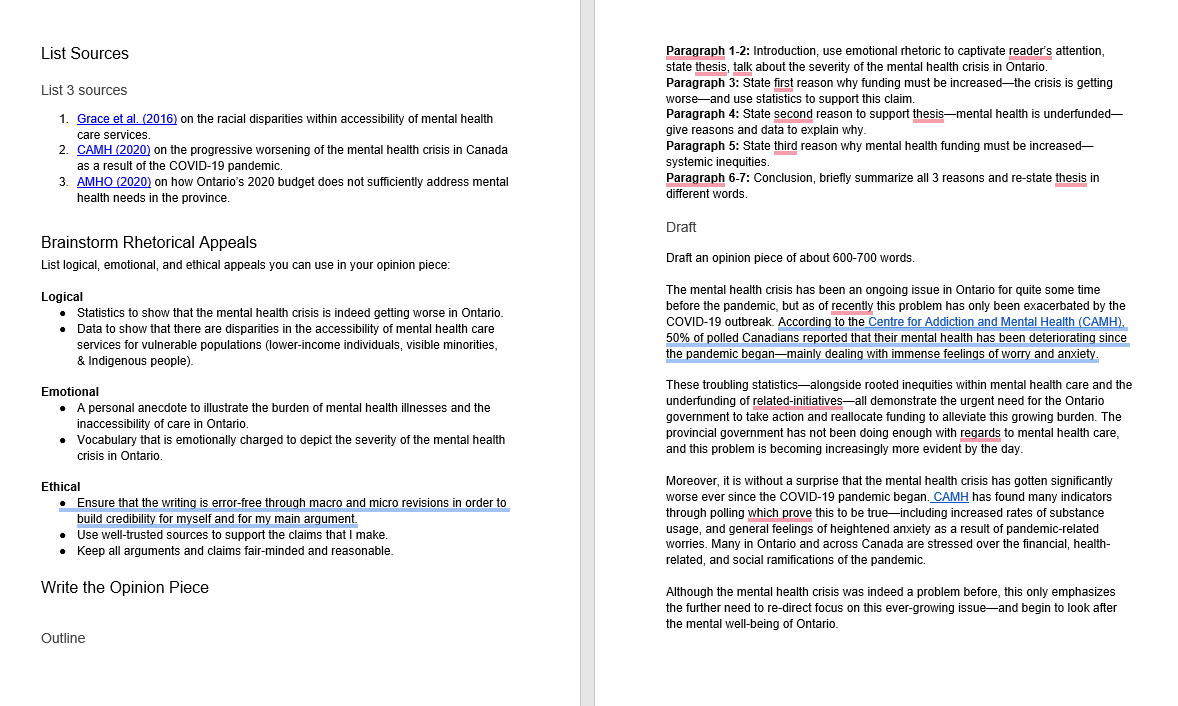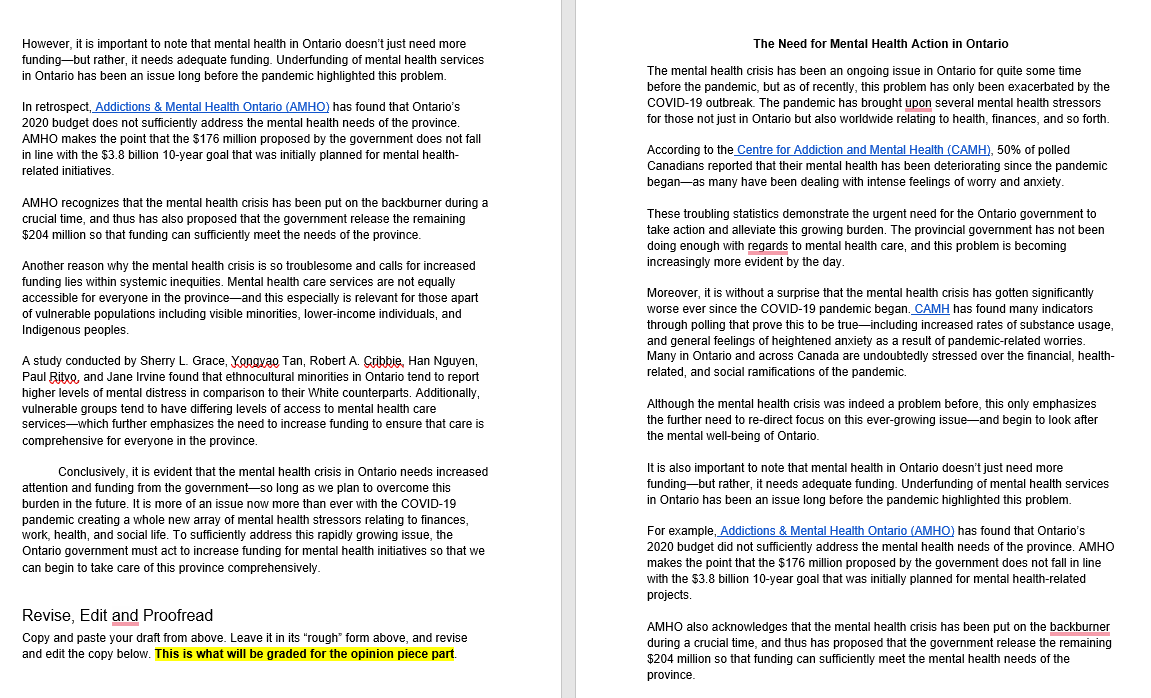Answered step by step
Verified Expert Solution
Question
1 Approved Answer
Sample One: Based on Argument By Grace Kheireddine, shared with permission Unit 12: Opinion Piece Set the Foundations Identify Type Op-ed State Issue, Thesis




Sample One: Based on Argument By Grace Kheireddine, shared with permission Unit 12: Opinion Piece Set the Foundations Identify Type Op-ed State Issue, Thesis and Key Reasons Issue: Should the Ontario government allocate more funding for mental health initiatives? Thesis: The Ontario government must take immediate action to alleviate the growing mental health crisis by increasing funding for mental health projects and resources in the province. Reasons: The mental health crisis is growing worse in conjunction with the COVID-19 pandemic and therefore requires more attention. Mental health initiatives in the province are severely underfunded. Systemic inequities-with regards to the inaccessibility of mental health services for vulnerable populations-make it crucial that the government directs more attention to the mental health crisis. List Sources List 3 sources 1. Grace et al. (2016) on the racial disparities within accessibility of mental health care services. 2. CAMH (2020) on the progressive worsening of the mental health crisis in Canada as a result of the COVID-19 pandemic. 3. AMHO (2020) on how Ontario's 2020 budget does not sufficiently address mental health needs in the province. Brainstorm Rhetorical Appeals List logical, emotional, and ethical appeals you can use in your opinion piece: Logical Statistics to show that the mental health crisis is indeed getting worse in Ontario. Data to show that there are disparities in the accessibility of mental health care services for vulnerable populations (lower-income individuals, visible minorities, & Indigenous people). Emotional A personal anecdote to illustrate the burden of mental health illnesses and the inaccessibility of care in Ontario. Vocabulary that is emotionally charged to depict the severity of the mental health crisis in Ontario. Ethical Ensure that the writing is error-free through macro and micro revisions in order to build credibility for myself and for my main argument. Use well-trusted sources to support the claims that I make. Keep all arguments and claims fair-minded and reasonable. Write the Opinion Piece Paragraph 1-2: Introduction, use emotional rhetoric to captivate reader's attention, state thesis, talk about the severity of the mental health crisis in Ontario. Paragraph 3: State first reason why funding must be increased-the crisis is getting worse-and use statistics to support this claim. Paragraph 4: State second reason to support thesis-mental health is underfunded- give reasons and data to explain why. Paragraph 5: State third reason why mental health funding must be increased- systemic inequities. Paragraph 6-7: Conclusion, briefly summarize all 3 reasons and re-state thesis in different words. Draft Draft an opinion piece of about 600-700 words. The mental health crisis has been an ongoing issue in Ontario for quite some time before the pandemic, but as of recently this problem has only been exacerbated by the COVID-19 outbreak. According to the Centre for Addiction and Mental Health (CAMH), 50% of polled Canadians reported that their mental health has been deteriorating since the pandemic began-mainly dealing with immense feelings of worry and anxiety. These troubling statistics-alongside rooted inequities within mental health care and the underfunding of related-initiatives-all demonstrate the urgent need for the Ontario government to take action and reallocate funding to alleviate this growing burden. The provincial government has not been doing enough with regards to mental health care, and this problem is becoming increasingly more evident by the day. Moreover, it is without a surprise that the mental health crisis has gotten significantly worse ever since the COVID-19 pandemic began. CAMH has found many indicators through polling which prove this to be true-including increased rates of substance usage, and general feelings of heightened anxiety as a result of pandemic-related worries. Many in Ontario and across Canada are stressed over the financial, health- related, and social ramifications of the pandemic. Although the mental health crisis was indeed a problem before, this only emphasizes the further need to re-direct focus on this ever-growing issue-and begin to look after the mental well-being of Ontario. Outline However, it is important to note that mental health in Ontario doesn't just need more funding--but rather, it needs adequate funding. Underfunding of mental health services in Ontario has been an issue long before the pandemic highlighted this problem. In retrospect, Addictions & Mental Health Ontario (AMHO) has found that Ontario's 2020 budget does not sufficiently address the mental health needs of the province. AMHO makes the point that the $176 million proposed by the government does not fall in line with the $3.8 billion 10-year goal that was initially planned for mental health- related initiatives. AMHO recognizes that the mental health crisis has been put on the backburner during a crucial time, and thus has also proposed that the government release the remaining $204 million so that funding can sufficiently meet the needs of the province. Another reason why the mental health crisis is so troublesome and calls for increased funding lies within systemic inequities. Mental health care services are not equally accessible for everyone in the province--and this especially is relevant for those apart of vulnerable populations including visible minorities, lower-income individuals, and Indigenous peoples. A study conducted by Sherry L. Grace, Yongyao Tan, Robert A. Gribbie, Han Nguyen, Paul Ritxo, and Jane Irvine found that ethnocultural minorities in Ontario tend to report higher levels of mental distress in comparison to their White counterparts. Additionally, vulnerable groups tend to have differing levels of access to mental health care services-which further emphasizes the need to increase funding to ensure that care is comprehensive for everyone in the province. Conclusively, it is evident that the mental health crisis in Ontario needs increased attention and funding from the government-so long as we plan to overcome this burden in the future. It is more of an issue now more than ever with the COVID-19 pandemic creating a whole new array of mental health stressors relating to finances, work, health, and social life. To sufficiently address this rapidly growing issue, the Ontario government must act to increase funding for mental health initiatives so that we can begin to take care of this province comprehensively. Revise, Edit and Proofread Copy and paste your draft from above. Leave it in its "rough" form above, and revise and edit the copy below. This is what will be graded for the opinion piece part. The Need for Mental Health Action in Ontario The mental health crisis has been an ongoing issue in Ontario for quite some time before the pandemic, but as of recently, this problem has only been exacerbated by the COVID-19 outbreak. The pandemic has brought upon several mental health stressors for those not just in Ontario but also worldwide relating to health, finances, and so forth. According to the Centre for Addiction and Mental Health (CAMH), 50% of polled Canadians reported that their mental health has been deteriorating since the pandemic began as many have been dealing with intense feelings of worry and anxiety. These troubling statistics demonstrate the urgent need for the Ontario government to take action and alleviate this growing burden. The provincial government has not been doing enough with regards to mental health care, and this problem is becoming increasingly more evident by the day. Moreover, it is without a surprise that the mental health crisis has gotten significantly worse ever since the COVID-19 pandemic began. CAMH has found many indicators through polling that prove this to be true-including increased rates of substance usage, and general feelings of heightened anxiety as a result of pandemic-related worries. Many in Ontario and across Canada are undoubtedly stressed over the financial, health- related, and social ramifications of the pandemic. Although the mental health crisis was indeed a problem before, this only emphasizes the further need to re-direct focus on this ever-growing issue-and begin to look after the mental well-being of Ontario. It is also important to note that mental health in Ontario doesn't just need more funding--but rather, it needs adequate funding. Underfunding of mental health services in Ontario has been an issue long before the pandemic highlighted this problem. For example, Addictions & Mental Health Ontario (AMHO) has found that Ontario's 2020 budget did not sufficiently address the mental health needs of the province. AMHO makes the point that the $176 million proposed by the government does not fall in line with the $3.8 billion 10-year goal that was initially planned for mental health-related projects. AMHO also acknowledges that the mental health crisis has been put on the backburner during a crucial time, and thus has proposed that the government release the remaining $204 million so that funding can sufficiently meet the mental health needs of the province. Another reason why the mental health crisis is so troublesome lies within systemic inequities. Mental health care services are not equally accessible for everyone in the province-and this especially is relevant for those part of vulnerable populations including visible minorities, lower-income individuals, and Indigenous peoples ("Access to mental health services must be more equitable," Toronto Star, Feb 3). Furthermore, a study conducted by Sherry L. Grace, Yongxao Tan, Robert A. Cribbie, Han Nguyen, Paul Ritxo, and Jane Irvine found that ethnocultural minorities in Ontario tend to report higher levels of mental distress in comparison to their White counterparts. This further emphasizes the need to increase funding and ensure that care is comprehensive for everyone in the province. Conclusively, it is evident that the mental health crisis in Ontario needs increased attention and funding from the government-so long as we plan to overcome this burden in the future. It is more of an issue now more than ever with the COVID-19 pandemic creating a whole new array of mental health stressors relating to finances, work, health, and social life. To sufficiently address this rapidly growing issue, the Ontario government must act now to increase funding for mental health initiatives so that we can begin to take care of this province again. In fact, according to the Centre for Addiction and Mental Health, 50% of Canadians have reported a worsening mental health ever since the pandemic has begun. With that being said, it is worthwhile to take a look at how the government has been handling the situation. Addictions and Mental Health Ontario has found that mental health is being underfunded by $204 million, which is a considerable amount of money that could be used for mental health initiatives. Also, inequities in the health care system make this problem even more difficult to deal with. For instance, a study published by BioMed Central found that in Ontario, ethnocultural minorities tend to report higher levels of mental distress when compared to their White counterparts. Although this can be attributed to a lot of different things, it does highlight the gaps in our health care system as it is clear that some vulnerable groups do not receive the help that they need. In conclusion, mental health is a complex issue in Ontario. It is getting progressively worse due to the pandemic and has always been plagued with issues such as underfunding and inequities. Therefore, I believe that the Ontario government must act as soon as possible to increase funding for mental health projects and help remedy this situation. Thank you for listening. Unit 13: Digital Presentation Analyze a Digital Presentation [N/A] Script Your Presentation Today I would like to speak about the mental health crisis in Ontario, and why I believe the government must step up to address this ever-growing issue with more funding. I'm sure we can all relate to experiencing some level of stress as a result of the pandemic-whether that be related to finances, health, or work, this pandemic has made a considerable impact on our mental well-being.
Step by Step Solution
There are 3 Steps involved in it
Step: 1

Get Instant Access to Expert-Tailored Solutions
See step-by-step solutions with expert insights and AI powered tools for academic success
Step: 2

Step: 3

Ace Your Homework with AI
Get the answers you need in no time with our AI-driven, step-by-step assistance
Get Started


